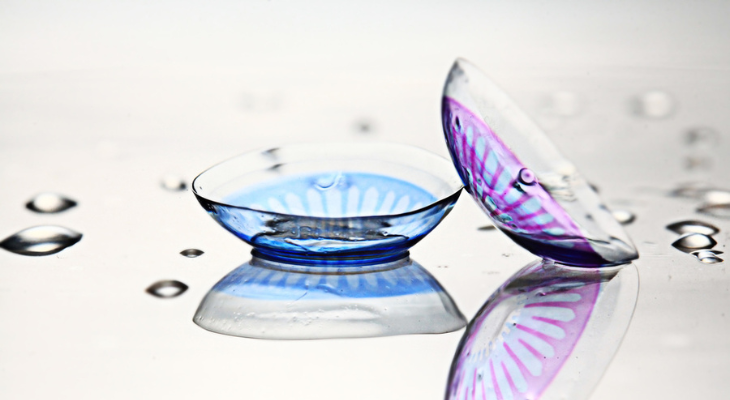
Can Colored Contacts Help with Your Vision?
Have you been thinking about changing your appearance with colored contact lenses? Although colored or tinted contacts are often used for their cosmetic benefits, the lenses can also offer vision benefits.
Using Colored Contact Lenses Improve Vision, Comfort, or Appearance
Adding a color or tint to contact lenses doesn't interfere with your vision. Your eye doctor may recommend colored or tinted lenses in the following situations:
- Glare Is a Problem. Does glare make it difficult to read or participate in outdoor activities? Contact lenses tinted yellow, blue, violet, green, or other colors decrease glare and improve contrast. The lenses can be helpful if you play sports. Thanks to your tinted lenses, you may notice that it's easier to follow a ball's path against the sky, or you might see objects or players more clearly on a sunny day. Your optometrist can recommend the best color for your lenses based on your needs. Tinted contact lenses may also be helpful if you have migraines triggered by bright light.
- Eyestrain Causes Blurry Vision. Blurry or double vision can be a problem if you spend hours reading or using digital devices. Eyestrain, a condition that causes sore eyes, headaches, and dry eye, has become increasingly common as more and more people use laptops, smartphones, and other digital devices. Wearing tinted colored lenses reduces glare and light sensitivity, two factors that contribute to eyestrain.
- Red-Green Color Blindness Makes It Difficult to Spot Color Differences. Red-green color blindness, the most common type of color vision deficiency, affects 1 in 12 males and 1 in 200 females of Northern European heritage, according to Medline Plus. Although colored contact lenses can't correct color blindness, wearing red-tinted lenses could make it a little easier to notice the contrast between colors.
- You Have Ocular Albinism. Ocular albinism occurs due to a deficiency of the melanin pigment that gives your irises their color. People with ocular albinism may have red, pink, or light blue irises, even though their skin may not be significantly lighter than normal. The condition affects visual acuity (sharpness) and may also cause depth perception issues, involuntary eye movements, optic nerve irregularities, and light sensitivity. Tinted contact lenses not only improve vision, but also decrease sensitivity to light and enhance the appearance of your irises.
- A Retinal Disease Causes Extreme Light Sensitivity. Diseases that affect the retina, the layer of light-sensing tissues at the back of the eye, can impair your vision and increase light sensitivity. Luckily, red-tinted contact lenses may decrease sensitivity while improving vision. In a research study published in Optometry and Vision Science, wearing red-tinted contacts reduced light sensitivity for all participants with retinal disease and improved visual acuity (sharpness) by one line for seven out of nine participants.
- You've Been Diagnosed with an Iris Condition. Your iris contains tiny muscles that allow your pupil to contract or expand to let more or less light into your eyes. Unfortunately, the muscles may not work so well if you were born with a condition that affects your irises or had an iris injury or surgery. Any type of iris condition or injury could increase your sensitivity to light or make your vision blurry. Colored contact lenses improve the problem by decreasing the amount of light that enters your eye and enhancing the sharpness of your vision.
Colored contact lenses can also be used to hide injuries or defects, such as a ruptured iris or scars on your eyes. When the lenses are used to hide defects, your eye doctor may recommend hand-painted or opaque lenses rather than tinted lenses.
Wondering if colored contacts could improve your vision? Contact our office to schedule a contact lens exam with the optometrist.
Sources:
PubMed: Optometry and Vision Science: Red-Tinted Contact Lenses May Improve Quality of Life in Retinal Diseases, 4/7/2016
https://pubmed.ncbi.nlm.nih.gov/26657696/
MedlinePlus: Color Vision Deficiency, 1/1/2015
https://medlineplus.gov/genetics/condition/color-vision-deficiency/#frequency
Review of Cornea and Contact Lenses: Colored Contacts: More Than a Pretty Eye, 2/15/2020
https://www.reviewofcontactlenses.com/article/colored-contacts-more-than-a-pretty-eye
20/20: Therapeutic Contact Lenses and Beyond, 5/1/2018
https://www.2020mag.com/ce/therapeutic-contact-lenses-and-beyond-18DB8
Optometry Times: Relieve Migraines with Tinted Contact Lenses, 1/15/2020
https://www.optometrytimes.com/view/relieve-migraines-tinted-contact-lenses

